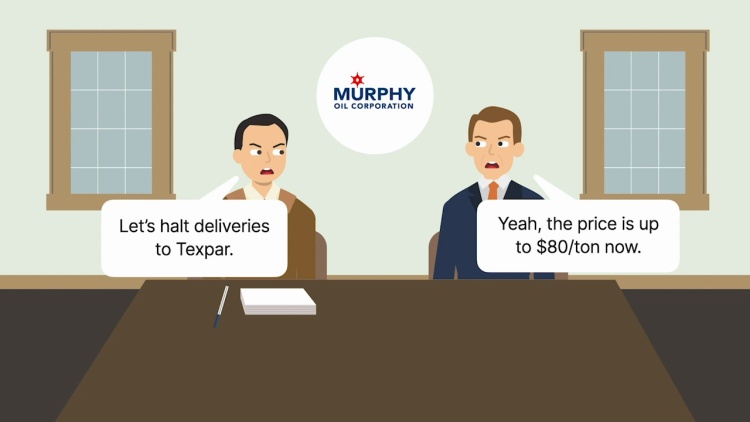Texpar Energy Inc. v. Murphy Oil USA, Inc.
United States Court of Appeals for the Seventh Circuit
45 F.3d 1111 (1995)
- Written by Tom Syverson, JD
Facts
In May of 1992, Murphy Oil USA, Inc. (Murphy) (defendant) contracted to sell 15,000 tons of asphalt to Texpar Energy Inc. (Texpar) (plaintiff). The contract price was $53 per ton. Texpar entered into a second contract to resell the asphalt to Starry Construction Company (Starry) at $56 per ton. Texpar stood to make $45,000 on the transaction. In June, the price of asphalt rose to $80 per ton. Murphy delivered about half the asphalt to Texpar, but then refused to make any further deliveries. Texpar could not complete the resale delivery to Starry. Starry ended up purchasing the remaining asphalt directly from Murphy at a price of $68.50 per ton. Texpar paid Starry $191,000 to cover the difference between the original $56 resale price and the $68.50 price Starry ended up paying. Texpar sued Murphy for breach of contract. The jury found for Texpar. The district court entered a judgment for $386,370 in market damages, which was based on the difference between the $53 contract price and the $80 market price at the time of Murphy’s breach. Murphy appealed. Murphy disputed the measure of damages, arguing that Texpar’s recovery should be limited to actual damages, which would be the $45,000 in lost profits and the $191,000 paid to Starry.
Rule of Law
Issue
Holding and Reasoning (Reavley, J.)
What to do next…
Here's why 904,000 law students have relied on our case briefs:
- Written by law professors and practitioners, not other law students. 47,100 briefs, keyed to 995 casebooks. Top-notch customer support.
- The right amount of information, includes the facts, issues, rule of law, holding and reasoning, and any concurrences and dissents.
- Access in your classes, works on your mobile and tablet. Massive library of related video lessons and high quality multiple-choice questions.
- Easy to use, uniform format for every case brief. Written in plain English, not in legalese. Our briefs summarize and simplify; they don’t just repeat the court’s language.





